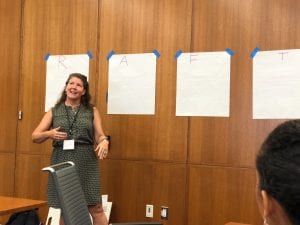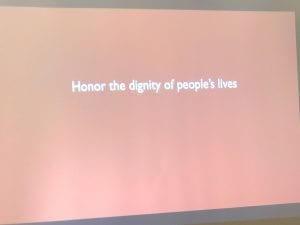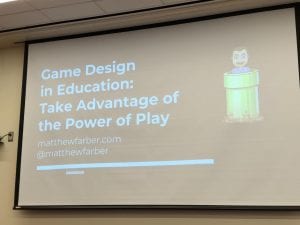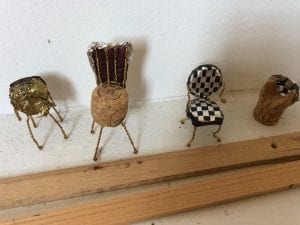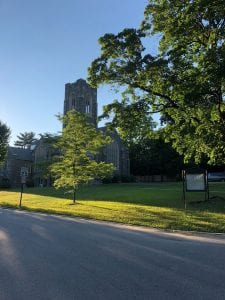If you’ve been following my Twitter feed, or even my Facebook posts, over the past few days, you may have seen that I’m at the Transformative Teacher Education Fellowship Summer Institute this week. Although my Twitter has been a frenzied series of thoughts and takeaways from my time here, those who have been following along with my Facebook posts may not know what I’ve been learning. So here’s a brief recap of some things I’ve encountered in the first evening and first 3 full days this week that I will bring into my teaching and research practice to begin my part in transforming teacher education:
Evening 1: Keynote by Kathy Schultz
After a very long day of travel, from California (and a 4:10 am wake-up), I made my way to the campus of Arcadia University, in Glenside, PA via Philadelphia. I had just enough time to grab my keys to my dorm room and meet my roomie, Sherry, before heading down to the opening keynote by Kathy Schultz. Kathy spoke about the notion of distrust and what teacher educators (and teachers) need to support students in these precarious times. Here are some of my more salient tweets from that evening:
The precarity of children’s lives, and lack of regard for humanity engenders distrust between children, families & institutions like schools – @kathyschultz22 @TTEFellowship #TTEF
— Betina Hsieh (@ProfHsieh) July 7, 2018
This. #slowness #attentiveness #activeselfcreation #time #attention & respect for #professionalism Trust must be built over time. PD must uphold the dignity of teachers & students. @kathyschultz22 @TTEFellowship pic.twitter.com/YZiksLMdar
— Betina Hsieh (@ProfHsieh) July 7, 2018
We often position distrustful students (e.g. unaccompanied minors, students of color) through deficit lenses, yet they bring much knowledge that educators can learn from in powerful ways. @kathyschultz22 @TTEFellowship #TTEF
— Betina Hsieh (@ProfHsieh) July 7, 2018
It is critical that we recognize teacher & student capacities for teaching, learning & becoming teachers. To do so, we must actively listen, respond and be open to continuous inquiry @kathyschultz22 @TTEFellowship #TTEF pic.twitter.com/KDjQ9RnMK3
— Betina Hsieh (@ProfHsieh) July 7, 2018
If teacher candidates aren’t introduced to the assets of communities in which they are expected to teach, they may fear or distrust these settings, particularly if these settings are different from their own educational experiences @TTEFellowship #TTEF @kathyschultz22
— Betina Hsieh (@ProfHsieh) July 7, 2018
#Listening is more than just hearing. We must listen to teachers and teacher candidates in the design of transformative teacher education in these precarious times @kathyschultz22 @TTEFellowship #TTEF pic.twitter.com/TBTGwzJcBu
— Betina Hsieh (@ProfHsieh) July 7, 2018
This foundational message is critical in these precarious times. We must tell stories of strength and upholding dignity as counter narratives in these turbulent times @kathyschultz22 @TTEFellowship #TTEF pic.twitter.com/jawKG2AtWw
— Betina Hsieh (@ProfHsieh) July 7, 2018
Some takeaways from Kathy’s talk were: the importance of telling our own stories as teacher educators, as offering important counter narratives to deficit thinking; the importance of educational spaces to actively engage distrustful students by acknowledging all that they bring into a learning space; and the slowness that it takes in building the foundation of trust upon which learning can take place.
Day 1: Making
TTEF is organized around some core elements of a connected learning framework: making, connecting, and hacking (as discussed in Kira Baker-Doyle’s Transformative Teachers book. The first full day of the institute centered around the idea of making. One of my biggest takeaways from Day 1 was around play and exploration. Making, for me, has always been so heavily connected to technology that it was helpful to have framing and activities that included technology, but also included other forms of play–engaging with card games for learning, and making a simple cardboard automata. It was such a fun day, and I really want to push myself to integrate more intentional, guided play (to promote learning) in my life and my teaching. Here are some of my favorite tweets from Day 1:
Love this quote: Play enhances learning and helps us to grow @MatthewFarber @TTEFellowship #TransformTeacherEd pic.twitter.com/3uz8hWdSy6
— Betina Hsieh (@ProfHsieh) July 8, 2018
Engagement doesn't always mean learning. Pedagogy must always be intentional @MatthewFarber @TTEFellowship #TransformTeacherEd
— Betina Hsieh (@ProfHsieh) July 8, 2018
The Migrant Trail "an impossible field trip" that helps promote empathy for those migrating across the US border from a migrant & border patrol agents: https://t.co/cZExFsBJhC –Again, this is a tool (a text) not a teacher. @MatthewFarber @TTEFellowship #TransformTeacherEd
— Betina Hsieh (@ProfHsieh) July 8, 2018
"Empowering game creators and social innovators to drive real-world impact through games": https://t.co/xZuhPb4RpW @MatthewFarber #TransformTeacherEd @TTEFellowship
— Betina Hsieh (@ProfHsieh) July 8, 2018
What are games? They should be purposeful. The core mechanics should be aligned to the learning goal. Games shouldn't just be a (fun) "reward"for doing a (learning) chore @MatthewFarber #TransformTeacherEd @TTEFellowship pic.twitter.com/G5mLJPEAxJ
— Betina Hsieh (@ProfHsieh) July 8, 2018
Gameful learning occurs at the nexus of lusory attitudes, high quality ignorance & identity play @MatthewFarber #playislearning @TTEFellowship #TransformTeacherEd pic.twitter.com/VnFMqq9tqf
— Betina Hsieh (@ProfHsieh) July 8, 2018
"High quality ignorance" = not knowing what the outcome is; this promotes #gamefullearning @MatthewFarber @TTEFellowship #TransformTeacherEd
— Betina Hsieh (@ProfHsieh) July 8, 2018
Sometimes our favorite educator jargon can be "loaded words" for students. These words have been used as labels for chore-like tasks or for them as failures (e.g. reader, if you're a "struggling reader;" coding as rote puzzles) @MatthewFarber @TTEFellowship #TransformTeacherEd pic.twitter.com/UGIGeDhoIZ
— Betina Hsieh (@ProfHsieh) July 8, 2018
Start with students and where their interests lie. 1 size (just like 1 game) does not fit all; let students be creative in their own learning @MatthewFarber #TransformTeacherEd @TTEFellowship
— Betina Hsieh (@ProfHsieh) July 8, 2018
Check out this Game Jam Guide from @MatthewFarber if you've been following my tweet from this morning's @TTEFellowship workshop #TransformTeacherEd https://t.co/v7vt9RlPcl
— Betina Hsieh (@ProfHsieh) July 8, 2018
What an amazing #PBL resource for teaching #digitalliteracy #medialiteracy & #newsliteracy : https://t.co/0jtLPmDio1 #TransformTeacherEd @MatthewFarber @TTEFellowship
— Betina Hsieh (@ProfHsieh) July 8, 2018
I made an #automata Simple but incredibly challenging #makerspace @TTEFellowship #TransformTeacherEd pic.twitter.com/eNUQ4ge44a
— Betina Hsieh (@ProfHsieh) July 8, 2018
Day 2: Connecting
Day 2 was organized around the theme of connecting. The presentation today by Nicole Mirra and Danielle Filipek on Youth Participatory Action Research really struck me as powerful, particularly in terms of how we can bring a critically informed lens to our inquiry about the world around us. I appreciated their ideas around dialogue and inquiry — how we can think about the ways we talk about issues; and how we can break down various problematic discourses, thinking about their root causes and what outcomes grow out of those discourses. These are really powerful practices for me to take back to my students. We ended Day 2 by joining a book club meeting around the book So You Want to Talk About Race by Ijeoma Oluo. Connecting with one another and others in the local community around the text was an important experience for me because text can really ground critical conversations about important topics. Just a few tweets from Day 2:
Where does research happen? It doesn’t have to just be in a lab or university, but can move through 2nd classrooms, 3rd spaces & in carpool pedagogies #TransformTeacherEd #Transformresearch @Nicole_Mirra @TTEFellowship pic.twitter.com/BAyHz5e0B2
— Betina Hsieh (@ProfHsieh) July 9, 2018
Conducting #inquiry into the root problems in our current educational contexts #TransformTeacherEd @flipster33 @Nicole_Mirra @TTEFellowship pic.twitter.com/813Bgostm8
— Betina Hsieh (@ProfHsieh) July 9, 2018
"Agency isn't a magic trick. Supporting students' sense of dignity requires intention. " — @flipster33 #TransformTeacherEd
— Transformative Teacher Educator Fellowship (@TTEFellowship) July 9, 2018
Day 3: Hacking
Day 3’s theme was hacking. Hacking is often equated with causing mischief and disruption, but hacking in education can be a powerful tool for creation. Some of the things we thought about in relation to hacking were: creating our collective civic futures through multiple forms of expression; how to hack what it means to interact with a text through collaborative annotation; how to hack instruction to put students at the center in facilitating powerful conversations; and finally, how to hack discourses that can deny some students their humanity and access to learning. We ended the day with my closing “web of learning” activity, showing our interconnections and thinking about ideas we are bringing forth into our work, and those ideas we are leaving behind that may not serve our goals. Some tweets from Day 3:
What does writing our civic future mean to me? What is civic writing and why does it matter? @Seecantrill asks these powerful questions. Here are my thoughts. @TTEFellowship #TransformTeacherEd pic.twitter.com/Ch2JBLbBzq
— Betina Hsieh (@ProfHsieh) July 10, 2018
Very cool public online annotation tool via @Seecantrill: https://t.co/ctIK66VOdx #TransformTeacherEd @TTEFellowship
— Betina Hsieh (@ProfHsieh) July 10, 2018
Moving from criticism to creation is important in helping teacher candidates to own their agency in addressing the problems they see #TransformTeacherEd @EmeryPetchauer @TTEFellowship
— Betina Hsieh (@ProfHsieh) July 10, 2018
Hacking (for education) anchors: Hacking is about creation not obstruction; 1 must understand curriculum to be a part of the larger discourse on education @EmeryPetchauer #TransformTeacherEd @TTEFellowship pic.twitter.com/bN8Hxmuf2S
— Betina Hsieh (@ProfHsieh) July 10, 2018
.@EmeryPetchauer highlights the importance of explicit instructions on how Twitter & Twitter chats work bc this type of discourse community is often foreign to teacher candidates (YES!) #TransformTeacherEd @TTEFellowship
— Betina Hsieh (@ProfHsieh) July 10, 2018
Core elements of hacker practices to hack educational discourse: using agentive tools, engaging in collective work, open/ public engagement, intentional-systemic approaches & product-oriented approach (what are you creating?) @KJBD #TransformTeacherEd @TTEFellowship
— Betina Hsieh (@ProfHsieh) July 10, 2018
We are hacking problematic discourses in teacher education #TransformTeacherEd @TTEFellowship pic.twitter.com/9irLz5MNvT
— Betina Hsieh (@ProfHsieh) July 10, 2018
We are all connected #TransformTeacherEd @TTEFellowship pic.twitter.com/1qbI7dsQXb
— Betina Hsieh (@ProfHsieh) July 10, 2018
Day 4: Envisioning
We just finished day 4. Today’s theme was envisioning. After writing into the day with Kelly, we had the opportunity to hear from Lynnette Mawhinney whose workshop on supporting teachers of color throughout the pipeline was so powerful. Lynnette highlighted the increasing gap between the percentage of students of color and that of teachers of color. While total percentage of teachers of color is getting better, it’s not doing so fast enough to keep pace with the growing number of students of color; in fact, 40% of schools still don’t have a single teacher of color. We then talked about microaggressions and other barriers to the success of teachers of color, that begin in preservice teacher education and continue as teachers of color enter their classrooms. I’m left with thinking about how to help my teacher candidates of color (who are disproportionately affected by gatekeeper tests for certification) navigate the barriers they face throughout the teacher pipeline, but particularly in terms of testing. In our closing activity, Yolanda reminded us that affirming our work is important. Her praise, question, polish protocol is one that I am excited to use in my own practice to push my teacher candidates and teachers to go deeper. Some tweets from today:
Probably my favorite activity so far, @lkmawhinney has us throwing chickens and tennis balls–group juggling is tough and requires team! @TTEFellowship #TransformTeacherEd
— Betina Hsieh (@ProfHsieh) July 11, 2018
Diversity statistics & disparities presented by @lkmawhinney: Over 40% of schools have no teachers of color #TransformTeacherEd @TTEFellowship pic.twitter.com/QegnC3w6kW
— Betina Hsieh (@ProfHsieh) July 11, 2018
Differences between white preservice teachers & preservice teachers of color = a difference between becoming a teacher & being a teacher — teaching can take on more complex meaning for TOCs @lkmawhinney #TransformTeacherEd @TTEFellowship pic.twitter.com/NyTM7seqac
— Betina Hsieh (@ProfHsieh) July 11, 2018
Within even social justice focused teacher education programs, candidates of color still experience microaggressions – @lkmawhinney #TransformTeacherEd @TTEFellowship pic.twitter.com/Su1hGOYzgL
— Betina Hsieh (@ProfHsieh) July 11, 2018
Microaggressions start at the preservice level for various teachers of color. Asian American teacher used as a wedge/ comparison; African American teacher feeling isolated in teacher ed program #TransformTeacherEd #notyourmodelminority #notyourwedge @lkmawhinney @TTEFellowship pic.twitter.com/xiHoMMnIqx
— Betina Hsieh (@ProfHsieh) July 11, 2018
#MSIs matter: Although #teachersofcolor are underrepresented among the teaching population, a majority of most racial subgroups come out of MSIs #teachered programs #TransformTeacherEd @lkmawhinney @TTEFellowship pic.twitter.com/xScWHVeeGk
— Betina Hsieh (@ProfHsieh) July 11, 2018
Moving Forward
Tomorrow, we begin applying all we’ve learned over the past 4 days to our course syllabi and projects for change in our institutions. I may be tweeting less, but I’ll certainly be thinking a lot, as I infuse all I’ve learned into the courses I’ll be planning, centering my teacher candidates and their students. I’ll keep you updated and I hope you’ll join me on the journey of transforming teacher education.

